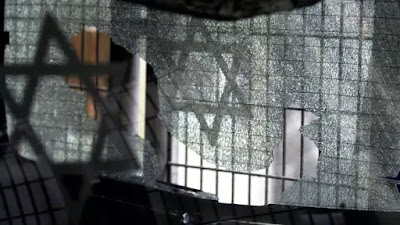When Turkey's long-term president Recep Tayyip Erdogan demonstratively met with Hamas official Ismail Haniya and his delegation in Istanbul in April, this caused understandable outrage, particularly in the EU, the USA and Israel. For Erdogan, the Palestinian terrorists are a "resistance organization".
At first glance, this could be perceived as a tactical maneuver by Erdogan to divert attention from the declining support of his party among Turkish citizens and from his disastrous economic policies that have led to rampant inflation in the country. However, in reality, Erdogan's anti-Semitism has a longstanding tradition dating back more than a hundred years, and the head of state himself has never kept it a secret – quite the opposite.
However, anti-Semitic enemy images and Israel-related anti-Semitism exist in Turkey today not only among right-wing and Islamist actors in politics but across the entire political spectrum, including the far left, as well as in the media and culture. It is a problem for society as a whole. The 30 essays that Corry Guttstadt has collected for the anthology "Antisemitism in and from Turkey" demonstrate this with a wealth of knowledge and detail. The nearly 550-page volume is published by the Hamburg State Center for Political Education (Landeszentrale für politische Bildung) and can be ordered there in German. Hopefully, translations into English or Turkish will be available soon.
Early recognition of Israel
Anti-Semitic clichés became acceptable on the Bosporus towards the end of the Ottoman Empire. Nevertheless, Turkey recognized Israel in 1949 - as the first Islamic state. According to Duygu Atlas, however, this was mainly due to tactical considerations and the rejection of the communist bloc during the Cold War. Atlas, based in Israel, lead a research on Kurdish and Jewish minorities in Turkey. "Initially, there was a certain sympathy for Israel among secular Kemalists and in left-wing circles," she writes, adding that the Arabs were a bigger enemy at the time.
However, the hatred of Jews by Islamist intellectuals such as Necip Fazil Kisakürek had been around for a long time. Today's head of state Erdogan likes to refer to him, as he does to his political mentor Necmettin Erbakan. Both adhered to the idea that the end of the Ottoman Empire was a Jewish conspiracy – a narrative still believed in less educated circles in Turkey because politicians and the right-wing media frequently repeat it. Svante E. Cornell writes: "Although the founders of the AKP broke with Erbakan, they never rejected his worldview of the conspiracy theorist. Even more tellingly, they never broke with Kisakürek, whom Erdogan and almost the entire AKP leadership glorify to this day."
A real hatred of the Israeli state developed after the Six-Day War in 1967, a hatred that did not reach its peak with right-wing radicals, but with the far-left THKP-C.
"A real hatred of the Israeli state developed after the Six-Day War in 1967.
In May 1971, members kidnapped the then Israeli Consul General Efraim Hofstaedter Elrom and murdered him a few days later. Elrom had been instrumental in the capture of Adolf Eichmann. The kidnappers chose him because he was easier to approach than the representatives of the USA or Iran, whom they had also scouted as symbols of Western imperialism (at the time of the Shah's regime, Iran was an ally of the USA). Seyda Demirdirek traces Elrom's life and work right up to his murder, suggesting that today's leftists in Turkey should be keen either to come to terms with this dark chapter or to sweep it under the carpet. Instead, we learn that the names of Elrom's murderers are still chanted threateningly at anti-Israeli demonstrations today.
Discrediting political opponents
Anyone who wants to discredit their political opponents in today's Turkey accuses them of being Jews or Armenians. This has even happened to actors such as Erdogan or his former ally Fethullah Gülen: Sometimes anti-Semitism backfires on those who spread it (interesting in this context is also the tracing of anti-Semitic passages in Gülen's books, which were apparently deleted in the German translations). And while the Armenian genocide is denied, the Holocaust is sometimes approved of.
"While the Armenian genocide is denied, the Holocaust is sometimes approved of."
This sentiment was not limited to the radical fringes of politics. Liz Behmoaras investigated anti-Semitic clichés in works by popular Turkish authors and then interviewed them to see whether their fictional portrayals corresponded to their actual attitudes. One of them was Aziz Nesin, a left-wing satirist and novelist (1915-1995) who is one of the most widely read Turkish authors of the 20th century. Behmoaras quotes him with the following response to her question: "The Jews are behaving in a way that justifies what Hitler did to them."
As much as political parties and groups in Turkey regularly fight against each other, if they were forced to agree on a lowest common denominator, it would be anti-Semitism, which they share almost universally. According to Karel Valansi, anti-Semitism is commonplace in Turkey. Although there are civilian counter-movements, as highlighted in this book, they are comparatively small and usually face significant challenges. They often try to argue with facts, which frequently bounce off people with entrenched prejudices and mindsets rooted in conspiracy narratives. Corry Guttstadt's important and groundbreaking book is a significant contribution to raising awareness of this issue and serves as an important foundational work on a topic that has received little attention to date.

Yorumlar